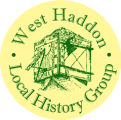Shops, crafts and part time farmers
West Haddon seems to have been a village of trade and Craftsmen for a very long time. One single landlord never owned the whole parish, as was once the case in places like Winwick and Watford, where the land was the only source of employment.
West Haddon’s land was more generally split between a number of independent families, some of whom earned all of their living from the land, but many more combined a sort of small holding enterprise with some other occupation. There was a large number of butchers most of whom seem to have been among the wealthiest villagers (perhaps the forerunners of the later village elite, the Graziers).
There were craftsmen of the sort needed by any reasonably self sufficient village – carpenters, masons, blacksmiths, brewers, shoemakers, together with a large number of people involved in textiles and clothing manufacture. In the 1650’s Henry Tomson was a Glover, Matthew Hickman a clothier, and Thomas Elmes a woolman. Weavers were John Skerall, Henry and Elias Page, and George Ringrose. Tailors were Mark Bonner, Edward Wills, William Molton, and William Walton – and there are no doubt probably others we haven’t yet discovered. Each of these men probably had a yard behind his house where chickens scratched, and a bit of grazing in the open fields for raising a sheep or a cow.
A new sort of village trader was beginning to look beyond the parish boundary with the rise of the Chandlers and Mercers. Chandlers were essentially dealers, buying and selling a particular commodity within a certain area. Mercers bought in a variety of goods wholesale, often from a distance, and retailed them in the village.
William Bonner was described as a Chandler in 1656 and he is the earliest trader we have found mention of so far. From 1700 Alexander Tarry and Thomas Page were Mercers, while in 1728 John Elmes described himself as a mercer and chandler, but we do not know what goods he dealt in. John Walker on the other hand, who was a mercer in 1748, had become a draper by 1753.
The earliest person we have discovered described as a shopkeeper is William Martin in 1786, although if the Legend of the Token recounted by J T page in 1905 is to be believed, then perhaps Elisha Almey kept the first village shop kept the first village shop on the site of what is now Crystal House in Station Road.
